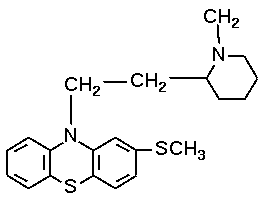Sink KM, Holden KF, Yaffe K. Pharmacological treatment of neuropsychiatric symptoms of dementia. A review of the evidence. JAMA 2005; 293:596-608.
* Clinical Question
How useful are the various pharmacologic agents in the management of neuropsychiatric symptoms of dementia?
* Bottom Line
Pharmacologic agents are minimally, if at all, effective in managing the neuropsychiatric symptoms of dementia. The atypical antipsychotics olanzapine (Zyprexa) and risperidone (Risperdal) are the most effective, but these agents may increase the risk of stroke. The decision to use any of these drugs must be made on the basis of individual circumstances. (LOE=1a-)
Study Design Systematic review
Setting Various (guideline)
Synopsis
Every week it seems as if somebody publishes Neuropsychiatric symptoms of dementia--such as agitation, aggression, delusions, hallucinations, and wandering--increase caregiver stress and lead to an increased risk of hospitalization and nursing home placement. To evaluate the value of various pharmacologic agents in treating these symptoms, the investigators systematically reviewed the English-language literature using Medline, the Cochrane Database of Systematic Reviews, and a manual search of relevant bibliographies. They included only doubleblind placebo-controlled randomized trials or meta-analyses of drug trials of patients with dementia that used measured outcomes, including neuropsychiatric symptoms.
Two authors independently evaluated the quality of each trial and a third served as the final arbitrator when consensus was not reached. From an initial 78 articles reviewed, only 25 randomized controlled trials and 4 meta-analyses met the inclusion criteria. The investigators do not discuss the possibility of publication bias but report informally on the homogeneity of the results.
The atypical antipsychotics, including olanzapine and risperidone, showed modest benefit in reducing agitation/aggression, hallucinations, and delusions. However, the atypical antipsychotics may increase the risk of stroke. There is no clear evidence that typical antipsychotics, such as haloperidol (Haldol), thioridazine (Mellaril), thiothixene (Navane), and chlorpromazine (Thorazine) were useful for treating any neuropsychiatric symptoms. Haloperidol may be slightly useful for reducing aggression, but the adverse effects may outweigh the benefits.
There is no evidence that 1 typical antipsychotic is more efficacious than any other. Trials investigating the use of serotonergic antidepressants reported no efficacy for treating neuro-psychiatric symptoms other than depression, with the exception of i industry-sponsored trial of citalopram (Celexa), which reported a 10-point reduction (out of 168 points) in agitation compared with placebo.
Mood stabilizers (eg, valproate [Depakote] and carbamazepine [Tegretol]) were ineffective.
The available evidence on cholinesterase inhibitors (eg, galantamine [Reminyl], donepezil [Aricept], rivastigmine [Exelon]) shows a small benefit (summary estimate of 1.72-point improvement vs placebo on a scale of 0 to 120). Most of the statistically significant difference was driven by 2 studies on a drug never approved for use by the Food and Drug Administration in the United States because of toxicities.
Memantine (Namenda) may be of some benefit, but the evidence is mixed and unlikely to be clinically significant.
COPYRIGHT 2005 Dowden Health Media, Inc.
COPYRIGHT 2005 Gale Group



